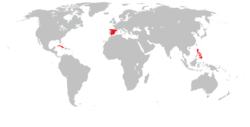Liberal Triennium
|
España Reino de España |
||||||||||
|
||||||||||
|
||||||||||
| Capital | Madrid | |||||||||
| Government | Constitutional monarchy | |||||||||
| Historical era | 19th century | |||||||||
| • | Riego uprising | 1820 | ||||||||
| • | Hundred Thousand Sons of Saint Louis | 1823 | ||||||||
|
||||||||||
The Trienio Liberal (Spanish pronunciation: [ˈtɾjenjo liβeˈɾal], "Liberal Triennium" is a period of 3 years in the modern history of Spain between 1820 and 1823, when a liberal government ruled Spain after a military uprising in January 1820 by the lieutenant-colonel Rafael de Riego against the absolutist rule of King Ferdinand VII .
It ended in 1823 when, with the approval of the crowned heads of Europe, a French army invaded Spain and reinstated the King's absolute power. This invasion is known in France as the "Spanish Expedition" (expédition d’Espagne), and in Spain as "The Hundred Thousand Sons of St. Louis".
King Ferdinand VII provoked widespread unrest, particularly in the army, by refusing to accept the liberal Spanish Constitution of 1812. The King sought to reclaim the Spanish colonies in the Americas that had recently revolted successfully, consequently depriving Spain from an important source of revenue.
In January 1820, soldiers assembled at Cadiz for an expedition to South America, angry over infrequent pay, bad food and poor quarters, mutinied under the leadership of Colonel Rafael del Riego y Nuñez. Pledging fealty to the 1812 Constitution, they seized their commander.
Subsequently, the rebel forces moved to nearby San Fernando, where they began preparations to march on the capital, Madrid.
Despite the rebels' relative weakness, Ferdinand accepted the constitution on March 9, 1820, granting power to liberal ministers and ushering in the so-called Liberal Triennium (el Trienio Liberal), a period of popular rule. However, political conspiracies of both right and left proliferated in Spain, as was the case across much of the rest of Europe. Liberal revolutionaries stormed the King's palace and seized Ferdinand VII, who was a prisoner of the Cortes in all but name for the next three years and retired to Aranjuez. The elections to the Cortes Generales in 1822 were won by Rafael del Riego. Ferdinand's supporters set themselves up at Urgell, took up arms and put in place an absolutist regency.
...
Wikipedia



